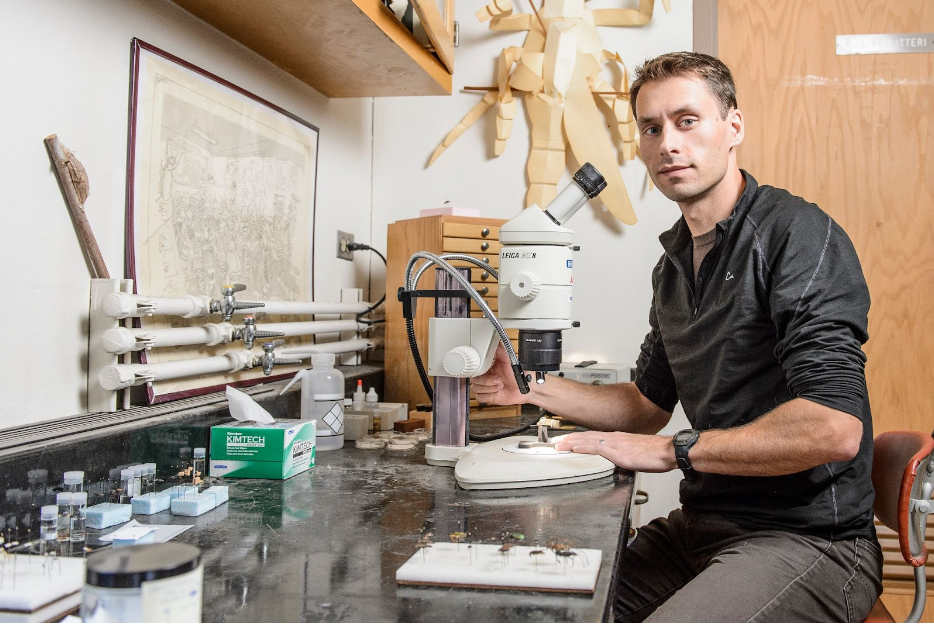The University of Wisconsin Insect Diagnostic Lab Director PJ Liesch, also known as the Wisconsin Bug Guy, studies several insect species across the state of Wisconsin.
Liesch’s interest in insects stemmed from his childhood experiences.
“I spent a lot of time outdoors as a kid catching insects of various kinds,” Liesch said. “I have always been interested in general biology, and I knew going into college from day one that I would be a biology major.”
According to the UW Department of Entomology’s website, Liesch has degrees in entomology and the biological sciences. As an undergraduate student at UW-Parkside, Liesch worked with UW-Madison professor Chris Williamson in researching the emerald ash borer, an invasive species that feeds on ash trees during their larval stage, which then causes tree death.
Recent study finds how principal investigators influence lab culture
The emerald ash borer appeared regularly in the news, but no one had found it in Wisconsin yet. For two summers, Liesch and Williamson observed ash trees, looking for emerald ash borers in the state of Wisconsin.
“That experience solidified my interest in entomology,” Liesch said.
This research led Liesch to come to UW-Madison to pursue his masters degree, following which he worked on campus as a research technician until taking the reins at the Insect Diagnostic Lab in 2014.
Liesch is the sole worker at the lab and takes on a plethora of responsibilities regarding the insects people bring in. His main task is identifying arthropods and educating people on entomology, or the study of insects and other arthropods, by developing fact sheets and websites that give more insight on these organisms.
“My primary duty for the lab is to serve as a diagnostician. That is handling insect and other arthropod samples,” Liesch said. “Most of the things that I look at and identify for people are insects, but there is a certain chunk of the pie in which there are other arthropods which can include spiders, centipedes, mites, etc.”
There are a broad range of people who visit Liesch’s lab with different arthropod samples. Other researchers, farmers, agricultural workers, medical workers, landscapers and gardeners, pest control professionals and the general public all visit the lab, Liesch said.
But Liesch’s enthusiasm for insects extends far beyond the lab. Outside the lab, Liesch partakes in various outreach efforts from being a regular speaker at expos, field days and workshops to being a frequent guest on the Wisconsin Public Radio’s Larry Meiller Show.
Liesch has also participated in the Wisconsin First Detector Network and the Master Gardener Program. He teaches in entomology-based programs such as the UW Farm and Industry Short Course and Wisconsin Pesticide Applicator Training.
Before Liesch inherited the director position, Phil Pellitteri directed the lab from its beginning in 1978 until his retirement in 2014.
Pellitteri’s interest in wildlife ecology began in undergrad. Pellitteri was a pre-med student and after four semesters of taking chemistry and other various medical science courses, he decided to take classes within other academic realms. This included entomology which furthered his interest in studying arthropods.
Science Magazine editor-in-chief on how science ‘lost’ America, how to gain it back
Pellitteri said the number of arthropod samples and the type of organisms brought into the lab vary with the seasons. Since there are less calls to the lab from September through March due to the weather, Pellitteri used this time to travel within the state and give lectures on entomology.
By serving as a diagnostician for the lab, Pellitteri understood how to research relatively unknown arthropods, particularly when issues involving those arthropods arise.
“During my career, one of the surprising things that broke out was head lice,” Pellitteri said. “It became common enough that people weren’t freaked out, but back when it started, nobody had ever seen it.”
Insects have been a part of the planet since the dawn of time and have been evolving food webs and the ecosystem as a whole. Arthropods take on many important duties in the environment as pollinators, natural predators and decomposers, Liesch said.
DEI interns measure imposter phenomenon within UW Biocore Program, find promising results
By developing a more enhanced understanding of ecology, individuals are less likely to strictly label arthropods as pests and appreciate their environmental benefits, Pellitteri said.
There is a general negative view of arthropods in society. Part of it stems from their behavior and also a lack of understanding of arthropods. With an increased understanding of these small, yet fascinating creatures, those negative associations tend to fade away, Liesch said.
“If you think about a dead animal on the side of the road, if we did not have flies and beetles and other organisms that fed on it, it would sit there for a very long time, but instead these arthropods help recycle those materials,” Liesch said.


















